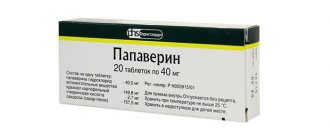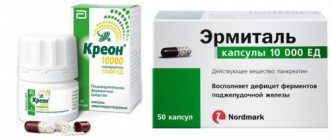Papaverine is an effective antispasmodic that is widely used in medical practice for various diseases. Papaverine suppositories are used for pathologies accompanied by spasm of the smooth muscles of hollow organs, for example, cholecystitis, renal colic, spastic colitis, bronchospasm, endarteritis, migraines and many other diseases. When administered rectally, the drug is quickly absorbed and its active components enter the bloodstream. The therapeutic effect occurs quite quickly.
Properties of the medicine
Papaverine hydrochloride suppositories, after administration into the rectum, affect the smooth muscles of the bronchi, lungs, large and small intestines, stomach, and uterus. However, the effect of the drug does not apply to the muscles of the skeleton and heart. After the product enters the body, these muscles work as usual.
Properties of the drug:
- elimination of smooth muscle tone in various pathologies;
- lowering blood pressure, dilating blood vessels;
- increased blood flow in all internal organs;
- normalization of heart rate;
- providing a sedative effect.
During childbirth, women are prescribed Papaverine suppositories to relieve cervical hypertonicity. Many people are interested in how to administer the drug vaginally or rectally? Papaverine suppositories are inserted into the patient's anus.
Form of production
Papaverine is available in the form of tablets of 10 and 40 mg, rectal suppositories of 20 mg and a solution for injection of 20 mg in one ampoule.
The tablets have a white or yellowish tint. They are odorless, have a bitter taste, and have two perpendicular marks. For adults, the drug is available in a dosage of 40 mg, for children – 10 mg. Packed in blisters of 10 pieces. The cardboard package contains 2 blisters.
The suppositories are produced in a torpedo-shaped form for insertion into the rectum, have a white tint, and are odorless. Dosage – 20 mg. One blister contains 10 suppositories. The cardboard package includes one blister and an insert – Papaverine’s instructions.
Papaverine solution is transparent, odorless, available in ampoules of 20 mg. Cardboard packaging includes 10 ampoules.
Indications
What is the medicine used for? Papaverine suppositories are used for many diseases that are accompanied by pain. The drug is widely used in gynecology, urology, and surgery.
Main indications:
- all types and stages of hemorrhoids;
- headaches caused by vasospasm;
- pain syndrome in various diseases of the digestive system;
- renal colic;
- pathologies of the urinary tract – pyelonephritis, cystitis, urolithiasis, urethritis;
- bronchitis, pneumonia;
- pain in women during menstruation.
Papaverine helps relieve spasms in various diseases
Papaverine suppositories have a positive effect on the gastrointestinal tract during constipation and help normalize stool. The drug effectively fights migraines. For bronchitis, the medicine relieves spasm from the bronchi and helps prevent swelling of the mucous membrane.
Mechanism of action
The therapeutic effect of Papaverine suppositories is ensured by suppressing the phosphodiesterase enzyme. Thanks to this, it is possible to relieve muscle spasms and relax muscle fibers. The medicine has an effect on the human genitourinary, digestive, and hepatobiliary systems, and also relieves vasospasm. The active component papaverine hydrochloride increases the lumen of blood vessels, thereby normalizing systemic blood pressure. After administration of the drug, its active component quickly penetrates the bloodstream. Papaverine hydrochloride is evenly distributed throughout the body, affecting the central nervous system.
Important! During use during pregnancy, the drug can penetrate the placenta to the fetus and enter milk during breastfeeding.
Compound
The composition of Papaverine depends on the form of release of the drug. In all cases, the medicine contains one active component - papaverine hydrochloride. Tablets, injection solution and suppositories include various auxiliary components. The exact information can be found in the table.
Chemical composition of various forms of Papaverine
The pharmacological group of the drug is myotropic antispasmodics, vasodilators.
International nonproprietary name (INN) – Papaverine, Papaverine (English), Papaverinum (Latin).
Contraindications
The instructions for use include a number of contraindications that must be taken into account when using the medicine. These include:
- presence of allergies to the components of the drug;
- increased intraocular pressure in glaucoma and other diseases;
- liver failure, accompanied by severe course;
- blockade of the heart muscle;
- old age of the patient;
- children's age up to 12 years.
Papaverine is prescribed by a doctor who must study the patient’s medical history and exclude all possible contraindications.
To whom the product is prohibited
Instructions for use of Papaverine include absolute and relative contraindications to the use of the medicine.
Absolute:
- individual sensitivity of the patient to the active and auxiliary substances of the drug;
- heart diseases associated with its conduction (blockades);
- acute kidney pathologies, renal failure;
- liver pathologies;
- glaucoma;
- age of patients after 65 years, which is associated with an increased risk of developing hypertension);
- children's age: injections/tablets/suppositories – 6 months/14 years/18 years.
When prescribing a drug, its contraindications must be taken into account.
Relative:
- recent traumatic brain injury;
- chronic renal failure;
- anaphylactic shock;
- vascular collapse;
- dysfunction of the adrenal cortex.
Important! The decision on the advisability of prescribing a drug in the presence of relative contraindications is made by the leading specialist, assessing the balance of benefit and risk in a particular case.
How to light candles
Where to insert Papaverine and how often can it be done? Suppositories should be used only as prescribed by a doctor. Typically, adults are administered 20-40 mg of the drug 2-3 times throughout the day. Sometimes a specialist may adjust the dosage depending on the diagnosis. Considering the question of how long the drug takes to act, it should be noted that on average the effect occurs after 30 – 40 minutes. Sometimes you have to wait longer for results. This depends on the characteristics of the disease and the individual qualities of the body.
The suppository should be administered according to the instructions.
With uterine hypertonicity
Increased uterine tone threatens premature birth. Papaverine suppositories help relieve spasms and relax smooth muscles. According to the doctor’s recommendation, a woman is given 2–3 suppositories throughout the day to tone the uterus. It is advisable for every pregnant woman to have this medicine in her home medicine cabinet, since when a spasm occurs, this drug will become an ambulance. The drug should be used carefully during treatment with other vaginal and rectal suppositories.
Sometimes the medicine is used among women in labor for false contractions. During this period, the woman experiences pain in the uterus and lower back, but this condition is only a harbinger of an imminent birth. To make a woman feel better, suppositories can be prescribed.
Possible side effects
Negative phenomena associated with the use of suppositories are extremely rare. This is evidenced by numerous positive reviews from patients and doctors who have tested the drug in practice. Sometimes during treatment with the product, minor itching and irritation occurs in the anal area. If the dose is greatly exceeded, the patient may experience the following complications:
- heart rhythm disturbance;
- dizziness;
- apathy and drowsiness;
- difficulty urinating and defecating;
- nausea, less often vomiting.
Treatment of the complications described above consists of blood purification and symptomatic treatment of the patient.
Important! If alarming signs develop during therapy with Papaverine, you should stop taking the drug and immediately visit a doctor.
Adverse reactions and overdose
In some cases, papaverine may cause adverse reactions:
- weakness, dizziness, drowsiness;
- dyspeptic symptoms (nausea, vomiting, dry mouth, constipation);
- allergic reactions;
- arrhythmias (atrioventricular block, extrasystoles, atrial fibrillation);
- collapse, hypotension;
- eosinophilia, increased levels of liver transaminases.
Side effects occur very rarely; if they occur, you should stop taking the drug and consult a doctor.
It must be taken into account that drugs such as dibazole, diphenhydramine, diclofenac enhance the effect of papaverine, and morphine and anticholinesterase drugs reduce its activity.
In case of overdose, the following symptoms may occur:
- double vision;
- hypotension, collapse;
- weakness;
- dry mouth;
- hyperventilation.
It is necessary to stop taking the drug and apply symptomatic therapy aimed at increasing blood pressure.
special instructions
When starting treatment with the drug, you should carefully study the instructions for use. It includes several special instructions that must be followed. These include:
- the medicine should be used with extreme caution in cases of severe renal failure;
- During treatment with suppositories, it is important to stop drinking alcohol;
- During pregnancy and lactation, suppositories are used under the strict supervision of a doctor. To date, there is not enough information about the safety of using the drug during this period;
- the active component of the drug can have a relaxing effect on the central nervous system, therefore, among people whose work activity requires increased concentration, the drug is used carefully.
In addition, if the patient is taking any other medications, be sure to inform the doctor.
Before starting treatment, it is important to read the instructions for the drug
Use during pregnancy
Despite the fact that one of the contraindications of Papaverine is the period of pregnancy and lactation, the drug is still prescribed to women bearing a child.
Many mothers face such a problem as increasing the tone of the uterus. This condition brings a lot of unpleasant sensations, in addition, it poses a threat of premature birth. To relax the muscles of the reproductive organ, Papaverine tablets or suppositories are often used. In a hospital setting, injections can be used.
Papaverine is used to prepare the cervix before childbirth. The drug is used in combination with No-Spa and other agents. Throughout the day, the woman is administered one suppository of each drug.
When breastfeeding, the use of Papaverine is contraindicated, since the active component of the drug passes into the mother's milk and therefore reaches the baby. If there is a need to use medication, stop feeding the baby.
Analogues of the drug
How to replace Papaverine suppositories? Among the analogues of the drug, the following drugs can be distinguished:
- No-Shpa is a medicine that is used for diseases associated with spasm of the smooth muscles of internal organs and blood vessels, as well as for the treatment of periodic pain;
- Spazmolysin suppositories - inserted into the anus for pain syndrome arising from diseases of the gastrointestinal tract and other organs, cholecystitis, pancreatitis, cystitis and other pathologies;
- Spascuprel - used to relax the smooth muscles of internal organs in diseases of the stomach, intestines, pancreas, kidneys and other organs;
- Theophedrine ІС – used for bronchial asthma, obstructive bronchitis to eliminate bronchospasm and ease the patient’s breathing;
- GastroComfort is an antispasmodic and carminative drug that is prescribed to patients with diseases of the digestive system;
- Niaspam - used for irritable bowel syndrome, renal and hepatic colic, and other pathologies of the digestive system.
You should take any of the analogues only after examination by a doctor.
Self-medication often causes serious negative consequences.
When to use the product
What is Papaverine used for? The medicine is used orally, rectally, intravenously or intramuscularly for various diseases that cause spasm of the smooth muscles of the body.
Indications for use of Papaverine are as follows:
- diseases of the abdominal organs (cholecystitis, spastic colitis, pancreatitis, etc.);
- as a complex treatment for relieving hypertensive crisis;
- violation of urine discharge from the kidneys;
- spasms of peripheral veins;
- conditions associated with contraction of cerebral vessels;
- to relieve angina attacks;
- respiratory dysfunction;
- narrowing of the renal arteries;
- narrowing of the urinary tract caused by spasm, causing urinary retention.
Papaverine should be taken strictly according to a doctor’s prescription, despite its wide spectrum of action and apparent safety. Improper use of the drug often provokes many side effects.
Patient reviews
Stanislav, Cheboksary “I was prescribed suppositories for exacerbation of hemorrhoids. The drug works quite quickly, relief occurs within 15 to 20 minutes. Papaverine is easy to find in any pharmacy, its cost is affordable. Over the course of several courses of therapy, I did not notice any side effects.”
Anastasia, Prokopyevsk “I was prescribed suppositories during pregnancy, when there was a threat of miscarriage. I lit one candle at night. In the ward where I was lying, this drug was prescribed to many girls. Papaverine does not cause side effects and relaxes the uterus well. The main advantage of candles is their low cost and availability.”
Marina, Cherkessk “At the age of 13, I started menstruating. This period is always very painful. She underwent many medical examinations, but doctors did not find any abnormalities. Papaverine suppositories save me. In the first days of menstruation, I put one candle in the morning and in the evening. Thanks to the drug, critical days pass easily. I haven't noticed any consequences yet. I recommend to everyone".
Natalya, Minsk “For many years I have been suffering from chronic cholecystitis, the disease is often accompanied by pain and other unpleasant sensations. One of the components of complex therapy prescribed by the attending physician is Papaverine suppositories. Despite its inexpensive cost, the medicine works great. The pain goes away within 10 minutes. I have been using the product for many years and suppositories have never let me down. “I heard a lot of negative feedback about the medicine, but I didn’t experience any side effects myself.”
Pharmacokinetics
The active substance, entering the body, is quickly absorbed, regardless of the form of release of the drug. Communication with blood proteins is up to 90%. The drug is metabolized in the liver. The approximate half-life of Papaverine ranges from half an hour to 120 minutes. Active and auxiliary components are excreted from the body by the kidneys in the form of metabolites.
The effect of the medicine is observed after 15 – 20 minutes








